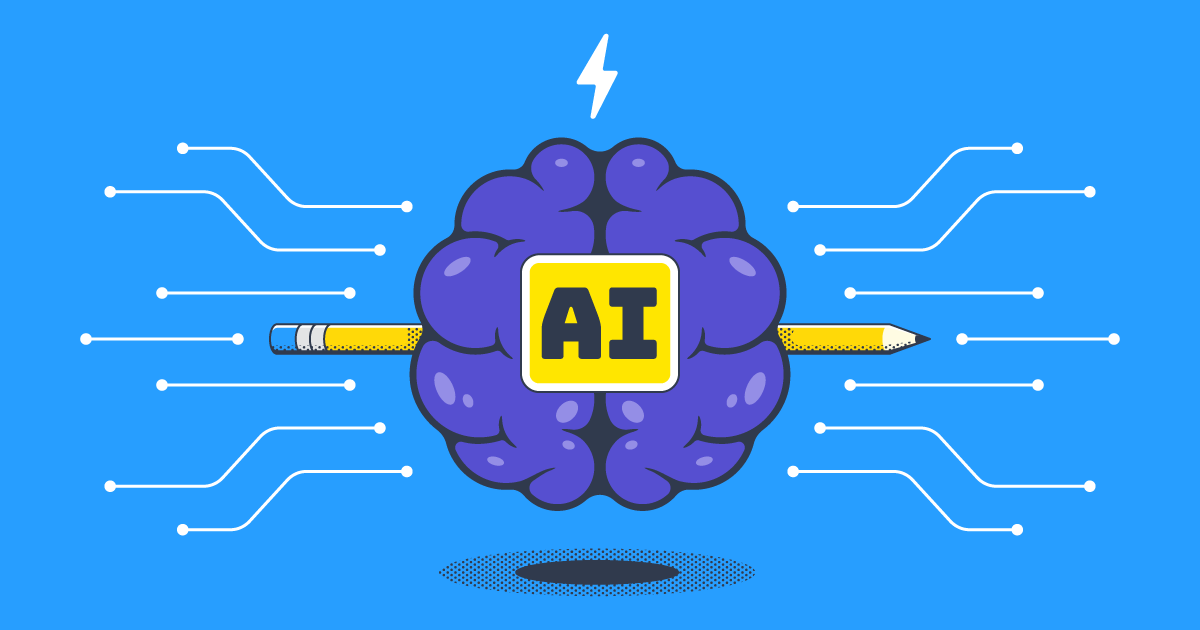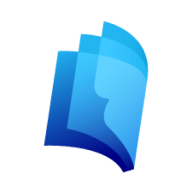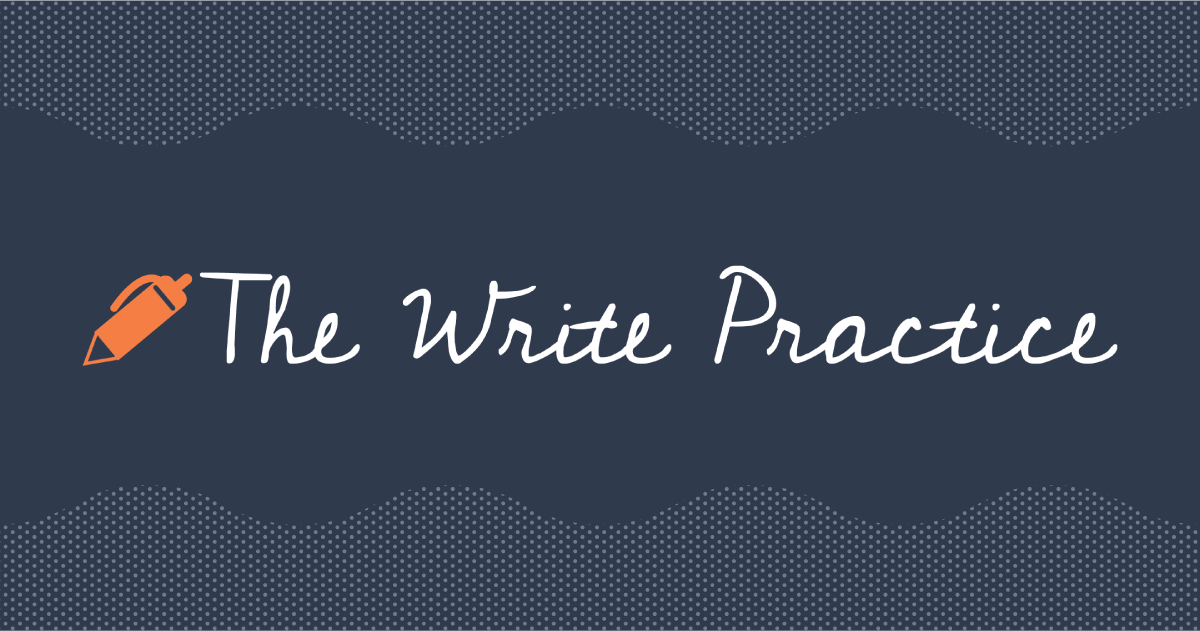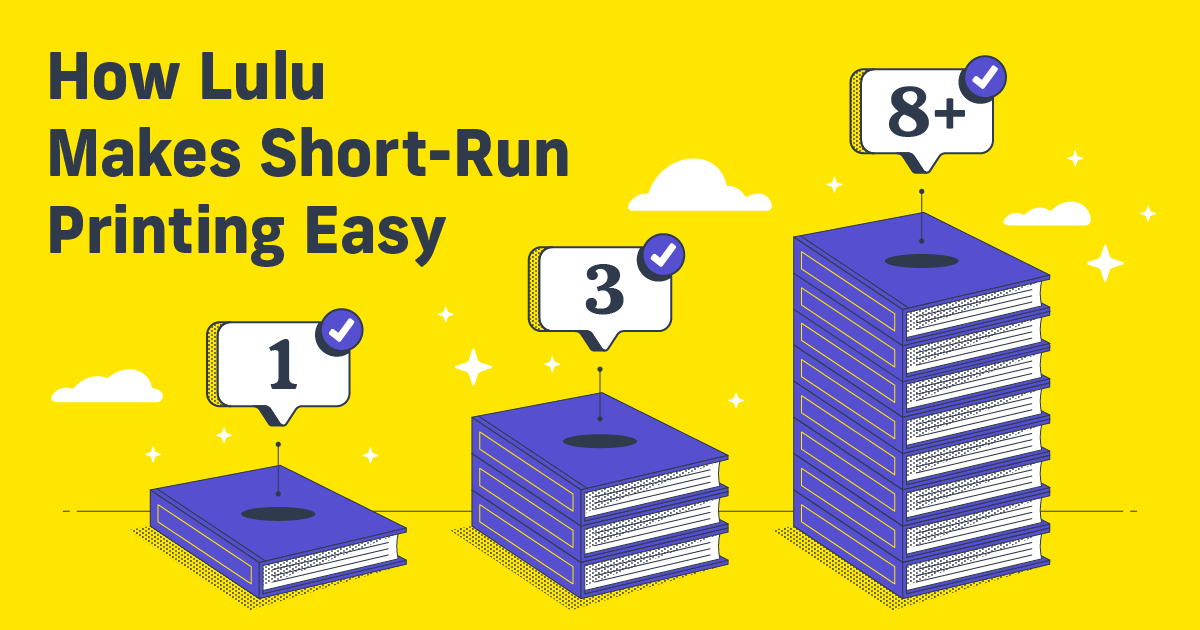Think Outside the Bot: How AI Can Help Content Creators
Creating content is a lot of work. And as an entrepreneur with a neverending to-do list, content creation tools that can alleviate that burden are crucial. Like most of us with an internet connection, you’ve probably noticed people talking about Artificial Intelligence (AI) tools like ChatGPT and Dall-E.
These and similar tools jumped right past being useful and immediately started freaking out creatives and businesses. Writers fear being replaced. Artists have pointed out that this new technology doesn’t particularly care about copyright.
Don’t panic. AI writing tools are not coming for your job.
While there are plenty of valid concerns you should have for any new content tool, it is important for writers and creators to understand how to use AI writing tools. Not because I think we’ll be using them to create a bestselling novel. No, the creative work will still be for us.
Generative AI will be useful in all the other parts of the content creation process. In this post, we’ll look at five ways AI can help you create better content and save you time, all without stealing your creativity.
Ways Authors and Creators Can Use Generative AI
- Research and Outline Content
- Correct Spelling, Grammar, and Syntax
- Improve Search Engine Optimization
- End Writer’s Block
- Create Product and Landing Page Text
What Is Artificial Intelligence?
Modern Generative Artificial Intelligence (GAI, but more often just AI) is a computer system designed to find patterns in data to generate new content. When I went to Dall-E and asked for “an old dog on a trampoline but he’s really bored with it” this is what I got:

The AI created this image by first scouring the internet for the best results that matched my phrase. Then it looked at all that data and created a picture of a dog on a trampoline. I think he could look a little more bored, but it’s not bad.
Likewise, text generators will take your request and produce AI-generated content for you. These work by taking some keywords or phrases and creating content from them. Or, like ChatGPT, the AI can work conversationally to make content for you:

Much like the way search engines take your search and give you websites, generative AIs take your query and give you content. It’s not always great content though, so you have to be particular about how you use AI.
How To Use AI as a Content Entrepreneur
Spoiler alert: it’s not for creating original content. Or, perhaps more accurately, it’s not for original content in the way you’re worried about. Could I make an entire book of pirate limericks using ChatGPT? Maybe. And that might be a fun project.
But it would be a novelty.
The content your audience wants has to be authentic. When you write a book or create an image, it has to come from you. Longform content from an AI is not going to replace human writers any time soon.
That doesn’t mean there aren’t ways you can make use of AI for content business. If anything, the growth of generative AI will lead to more content marketing and likely better content. In the coming years, AI writing tools will become mainstream. Electing not to experiment with them now may leave you playing catch up as your competitors use AI writers to outline marketing copy, create landing pages, and generate topic ideas.
Using AI for Research and Outlining
For years, I’ve used keyword research tools like SEMRush and Moz to find terms people use when searching Google and to find similar content I’ll be competing against. Those tools are “scraping” the internet for information—keywords, traffic to related sites, and much more—to help me find competitors and possible gaps we can write a piece of content to fill.
Generative AIs like ChatGPT also scrape the web to build a response to your query. This makes these tools perfect for research and outlining. Creating an outline is the best use case (currently) for AI content generators. Even the best results won’t be optimized, but it will give you plenty of ideas to work with.
Here’s an example:
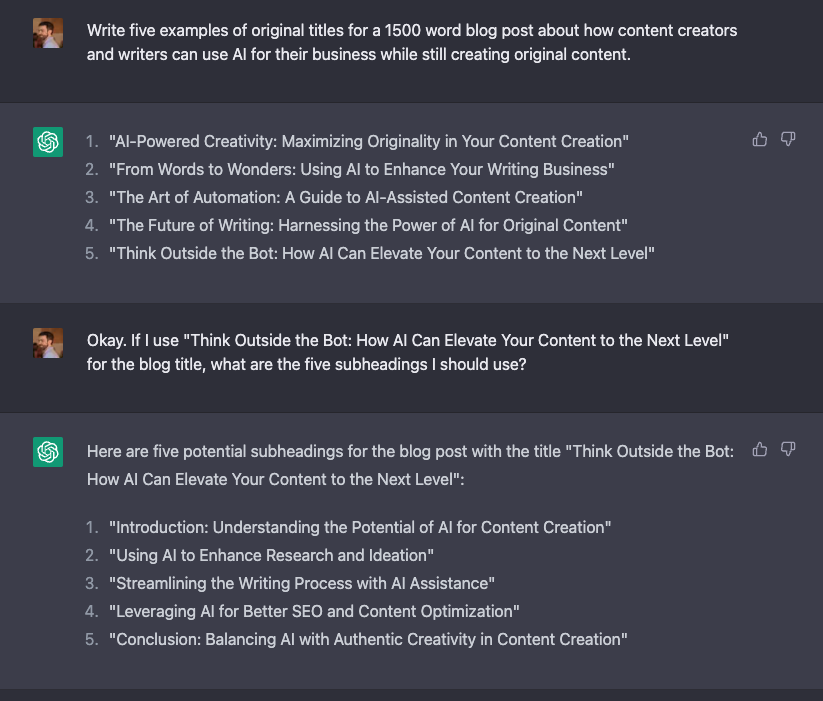
Yup, that’s right, I used an AI to help write this article that you’re reading!
First, I gave a somewhat detailed description of the post:
“a 1500 word blog post about how content creators and writers can use AI for their business while still creating original content”
The more detail you can put in, the more the AI has to work with. Then I asked it to generate a title. The results are… fine. Bordering on mediocre.
That doesn’t mean they’re worthless though. This AI just used the scraped information from the internet about AI, content creators, business, and creating original content, then found five unique ways to present the information I requested. You could have done the same without the AI—in fact, I use (now formerly used) a spreadsheet to track article titles I like and I refer to it when drafting blog titles.
But that takes a lot of time. My interaction with ChatGPT took minutes. These tools will speed up the content creation process.
And, as you can see from the example, I can go from a title I like to creating subheadings for the post. Again, none of the subheadings are usable as-is. But they help me see the structure and content that ChatGPT sees from other content. Now I know what sub-topics matter to searchers and how readers might expect my article to be organized. That’s not only a way to optimize the piece of content you’re writing, but it also provides some valuable audience research that helps you better understand the people you’re writing for.
All valuable info that took me under five minutes to gather.
Create Better Content With an AI Writing Assistant
Okay, the term “AI Writing Assistant” makes me feel a little icky. If you feel the same way, take a step back and consider how much you already rely on AI-powered content generation.
For example, I typed ‘exmaple’ while writing this sentence. As I continued to write, a red line let me know I made an error. That’s Grammarly being a helpful AI writing assistant.
We’ve been letting AIs (albeit less sophisticated ones) help us write since the earliest days of digital word processors. Spelling and grammar checks are built on AIs. Using machine learning software to fix typos and the like probably seems minor. But when you let Grammarly reorganize a sentence for clarity, that’s AI content generation.
Here are the three assistant AIs I use regularly:
Note that none of these three offer content creation or any way to gather content ideas. AI assistants are the most invaluable form of modern AI and if you’re not already using a tool like Grammarly to clean up obvious spelling errors or fix run-on sentences, you’re just making more work for yourself. But you already know that.
These new tools like ChatGPT or Jasper will become part of your content strategy just like Grammarly becomes part of your content creation.
Use AI to Improve SEO and Content Optimization
I mentioned earlier using tools like Moz and SEMRush to build refined keyword lists. Alongside generative AI tools like ChatGPT, it’s possible to define a set of keywords and build an outline (including topics and subheadings) that is far more robust than I could create on my own.
For professional copywriters and content creators who need their content to rank well, this is going to be a powerful new way to utilize AI. Following the same example I used above, I could ask ChatGPT to follow up on the title and subheadings with some keywords:
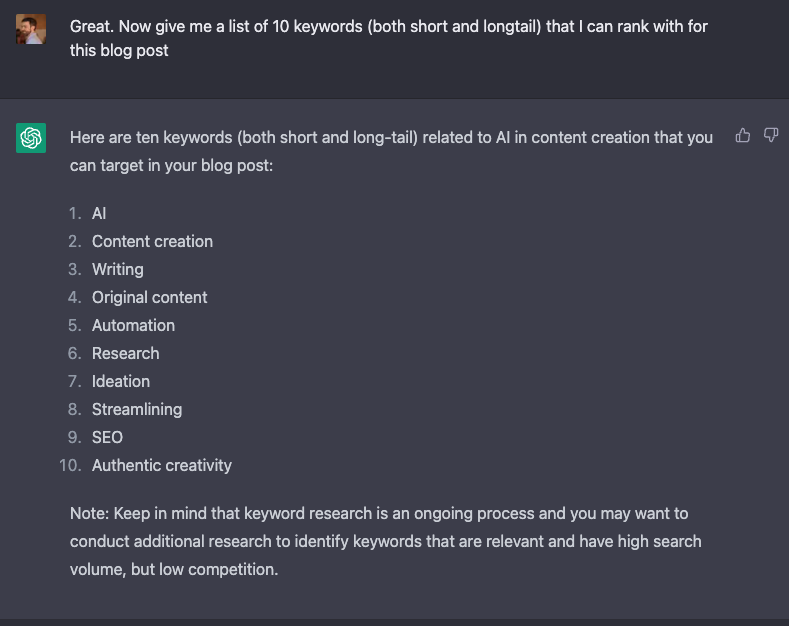
A keyword list like this might not be that helpful alone. But it’s a place to start. Which, for keyword research, can be tough. Now, I never have to ponder how to start keyword research again. I can just pump queries into an AI content creation tool and ideas will come flowing back.
AI Writers Will End Writer’s Block
Whether you write novels or blog posts, you’ve undoubtedly experienced the soul-clenching horror that is a blank white screen with nothing but a blinking cursor nagging you to write something. Anything. That moment when we’re brimming with ideas but unable to form them into coherent sentences. This is a problem that only exists for human writers.
Generative AI offers a solution. Here’s a question I ask myself at least once a week:
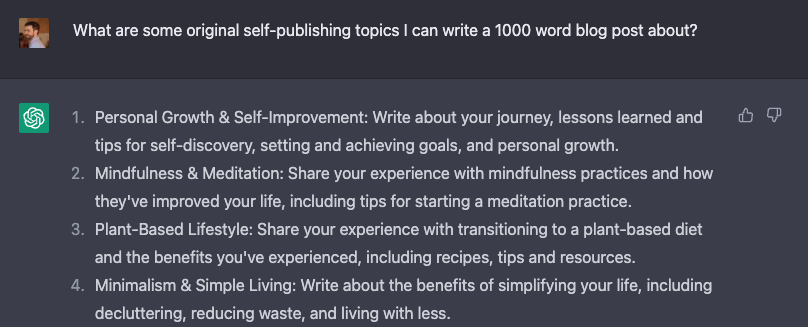
Now, let’s be fair: those responses from ChatGPT are not great. And definitely aren’t going to be topics I will write about anytime soon. But I’m not staring at a flashing cursor on a blank screen.
From here, I can refine the list. Tell it one or two I liked and ask for more. I can let the AI help me pick apart my ideas and find topics or angles I can use to write something that people will find valuable.
Remember too that your AI writer is looking at a LOT of content to give you these ideas. So with some refinement to your questions, you can start to generate usable ideas.
Using AI Writers for Website Pages
For the most part, you’re only going to use generative AI to help guide your writing and to develop SEO-friendly headlines and outlines. But there is one area where the power of AI writing can help your content business by directly creating content for you: using AI to write your product pages and landing pages.
Your website is an important hub for all your content. It’s vital that your website also be well-optimized for search engines so new fans can discover you. That’s where AI-generated content can be helpful.
Using an AI writer to create the content (like Headings, product and service descriptions, and Calls to Action) for a new product’s page can save you time and help ensure your product page looks like the product page should. Likewise for landing pages. Or you could update your product descriptions to match a target audience or optimize content for search results.

You can use your AI tools to research the right keywords for a landing page or product page, but to save time you should consider letting the AI write the first draft of the page copy too.
Generative AI is great for putting out basic, highly specific content. Here’s an example of a book’s product page written by ChatGPT:
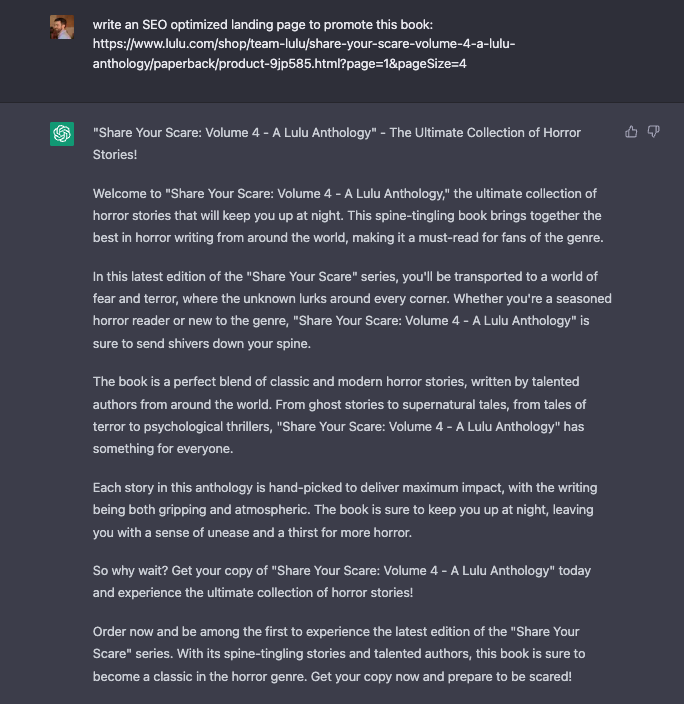
I asked for an SEO-optimized landing page for an edition of our Share Your Scare books. This is precisely the kind of page you’ll want to create when launching a new book or running a campaign to promote a book you’ve already published.
As you can see, the AI writer created a lot of copy for me in only 30 seconds. It needs to be edited but on the whole, it’s very good. That saves me the time I can spend writing creative content that needs to be human.
Simple content generated by AI is a powerful timesaver and helps ensure your pages are optimized for search.
The Problem With AI
There is one glaring problem with AI writers: the fear that copywriters will be out of work soon. Who needs to pay a person thousands of dollars a year when content tools like ChatGPT can do it for free? Am I right?
Let’s be clear on this: generative AI will not be replacing people as content creators anytime soon. While these AIs are great at keyword-rich phrases, they lack our ability to speak to an audience and to do so authentically.
Here are examples from three popular AI writing tools after being prompted to write the intro paragraph for this blog post:
- As a content creator, you are always looking for ways to save time and produce high-quality work. Artificial intelligence (AI) can help you with both of these goals. In this blog post, we will discuss how AI can be used by content creators to improve their writing. We will also provide tips on how to get started using AI tools, and list some examples of AI writing tools that you can use.
- Content creators are always on the lookout for advanced tools to assist them in their work. Artificial Intelligence (AI) can be a powerful tool for content creators, providing assistance with research, editing, and outlining. By taking advantage of this technology, content creators can save time and energy while still producing high-quality content. Let’s take a look at how AI can help content creators in their work.
- Artificial intelligence (AI) has transformed many industries, and content creation is no exception. As a content creator, you’re constantly under pressure to produce high-quality, engaging content on a regular basis. With AI, you can streamline your workflow and focus on the most important aspects of content creation, such as research, editing, and outlining. By leveraging the power of AI, you can not only save time and energy but also create content that is more accurate, relevant, and valuable to your audience. In this blog post, we’ll explore the ways in which content creators can use AI to create necessary content, without sacrificing the human touch.
These aren’t bad, but they aren’t great either. What’s valuable here is to compare and look for patterns. That’s how you can leverage your AI writers to understand what others have written (remember, it’s scraping the web) and to draw inspiration for your own content writing.
AI Tools for Your Content Business
Once we accept that AI-generated content won’t be eliminating content creation jobs, we all have to consider how we might be able to use these tools to enhance our content marketing efforts. If you’re new to AI writers, start with ChatGPT. It’s free and open access. The responses often miss the mark, but I think that actually makes it easier to get used to using the tool and understanding its limitations. Try doing some blog outlines or email subject lines. You could also experiment with social media posts—anything relatively short and direct you can prompt the AI writing tool to create so you can get accustomed to using it.
Once you’re ready to use more complex AI tools to fine-tune your content or create consistency through style guides, you might try Jasper or Writer. Both of these platforms aim to generate more AI content and a variety of content types but also make it easy for you to get in and edit/update both the prompts and the content to refine your writing.
And of course don’t neglect all the commonplace AI tools like Grammarly, Moz, and the like that have long been staples for content marketers and entrepreneurs. As creators today, we’ve never had access to more tools to assist in our work. Now we can utilize powerful AI tools for content strategy, to optimize long-form content, and get better results from our searches.
Don’t regard AI writing as the enemy. Instead, look for ways you can use these tools to create better original content for your audience, develop better content marketing strategies, and streamline the creation process for yourself.

